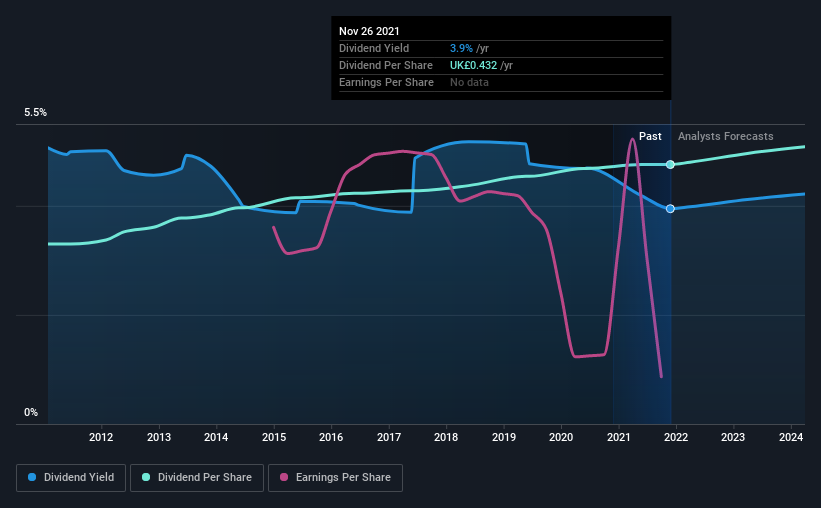- United Kingdom
- /
- Water Utilities
- /
- LSE:UU.
United Utilities Group's (LON:UU.) Dividend Will Be Increased To UK£0.14

United Utilities Group PLC's (LON:UU.) dividend will be increasing on the 1st of February to UK£0.14, with investors receiving 0.6% more than last year. This makes the dividend yield 4.0%, which is above the industry average.
See our latest analysis for United Utilities Group
United Utilities Group Is Paying Out More Than It Is Earning
If the payments aren't sustainable, a high yield for a few years won't matter that much. Based on the last payment, the dividend made up 93% of cash flows, but a higher proportion of net income. While the cash payout ratio isn't necessarily a cause for concern, the company is probably focusing more on returning cash to shareholders than growing the business.
Earnings per share is forecast to rise exponentially over the next year. If the dividend continues growing along recent trends, we estimate the payout ratio could reach 98%, which is unsustainable.

United Utilities Group Has A Solid Track Record
The company has been paying a dividend for a long time, and it has been quite stable which gives us confidence in the future dividend potential. The first annual payment during the last 10 years was UK£0.30 in 2011, and the most recent fiscal year payment was UK£0.43. This means that it has been growing its distributions at 3.7% per annum over that time. Although we can't deny that the dividend has been remarkably stable in the past, the growth has been pretty muted.
The Dividend Has Limited Growth Potential
Some investors will be chomping at the bit to buy some of the company's stock based on its dividend history. Unfortunately things aren't as good as they seem. Earnings per share has been sinking by 29% over the last five years. A sharp decline in earnings per share is not great from from a dividend perspective. Even conservative payout ratios can come under pressure if earnings fall far enough. Over the next year, however, earnings are actually predicted to rise, but we would still be cautious until a track record of earnings growth can be built.
United Utilities Group's Dividend Doesn't Look Sustainable
Overall, we always like to see the dividend being raised, but we don't think United Utilities Group will make a great income stock. We can't deny that the payments have been very stable, but we are a little bit worried about the very high payout ratio. We would probably look elsewhere for an income investment.
It's important to note that companies having a consistent dividend policy will generate greater investor confidence than those having an erratic one. However, there are other things to consider for investors when analysing stock performance. For example, we've identified 3 warning signs for United Utilities Group (2 can't be ignored!) that you should be aware of before investing. If you are a dividend investor, you might also want to look at our curated list of high performing dividend stock.
New: AI Stock Screener & Alerts
Our new AI Stock Screener scans the market every day to uncover opportunities.
• Dividend Powerhouses (3%+ Yield)
• Undervalued Small Caps with Insider Buying
• High growth Tech and AI Companies
Or build your own from over 50 metrics.
This article by Simply Wall St is general in nature. We provide commentary based on historical data and analyst forecasts only using an unbiased methodology and our articles are not intended to be financial advice. It does not constitute a recommendation to buy or sell any stock, and does not take account of your objectives, or your financial situation. We aim to bring you long-term focused analysis driven by fundamental data. Note that our analysis may not factor in the latest price-sensitive company announcements or qualitative material. Simply Wall St has no position in any stocks mentioned.
Have feedback on this article? Concerned about the content? Get in touch with us directly. Alternatively, email editorial-team (at) simplywallst.com.
About LSE:UU.
United Utilities Group
Provides water and wastewater services in the United Kingdom.
High growth potential second-rate dividend payer.


